Posts Tagged ‘Burma Partnership’ (399 found)
Defending Human Rights Still a Risky Business in Burma
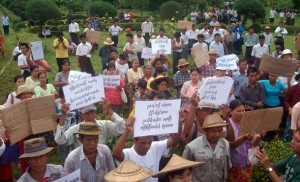 Last week former political prisoner Wai Lu, who was helping protesting farmers win back land confiscated by a copper mining company in the Latpadaung mountain range, was taken off a bus and arrested on his way back to Rangoon. Family members have been told he is being charged under Burma’s Religious Offenses Act, yet they haven’t had a chance to see him since his arrest and don’t know where he is being held.
Last week former political prisoner Wai Lu, who was helping protesting farmers win back land confiscated by a copper mining company in the Latpadaung mountain range, was taken off a bus and arrested on his way back to Rangoon. Family members have been told he is being charged under Burma’s Religious Offenses Act, yet they haven’t had a chance to see him since his arrest and don’t know where he is being held.
Wai Lu is not an isolated case. In the last two months, human rights defenders have been arbitrarily arrested for defending people’s freedom of assembly and for participating in protests. On 7 August, police in Mandalay detained labor activist Aye Thein after he represented vendors protesting against their relocation. In early July, the government harassed and detained student activists in order to prevent them from holding commemorations of the 50th anniversary of the military regime’s crackdown on students. In May, the Police arrested and intimidated more than 40 protesters who took part in the nationwide peaceful candlelight protest for electricity. Naw Ohn Hla, a former political prisoner, claims the authorities continue to spy on her since she led these protests […]
Burma: Come Home But Be Quiet
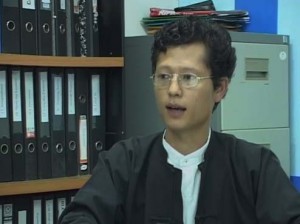 On Thursday, the office of President Thein Sein released the names of some 2,000 people who were removed from Burma’s infamous blacklist. For most of the people who discovered their names on the list it must have been an unprecedented moment, coming home was finally conceivable after years in exile. Yet looking at it more closely it appears that Thein Sein’s invitation to come home is also an invitation to remain quiet.
On Thursday, the office of President Thein Sein released the names of some 2,000 people who were removed from Burma’s infamous blacklist. For most of the people who discovered their names on the list it must have been an unprecedented moment, coming home was finally conceivable after years in exile. Yet looking at it more closely it appears that Thein Sein’s invitation to come home is also an invitation to remain quiet.
Little was said in the news about the more than 4,000 names remaining on the blacklist. Who are they? Why are they still on the list? When will they be removed? The only person who does know is President Thein Sein, thus ensuring that he still has the discretionary power to select who is and who is not allowed back home.
Welcoming exiles back to Burma and truly opening a space for free speech would mean consigning the entire concept of a blacklist to the history books. For Thein Sein’s invitation to be serious and genuine it must extend to everybody […]
Burma Ends Pre-Publication Check, Not Censorship
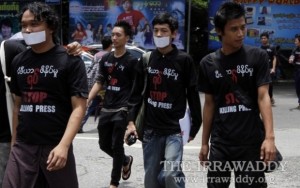 Prior submission of print media content that had been imposed for the last 48 years ended when the Press Scrutiny and Registration Board (PSRD) introduced its post-publication checks that came effective on 20 August. Journals and newspapers no longer need to submit their publication beforehand but afterward. However, the 1962 Printers and Publishers Registration Act and the 2004 Electronics Transaction Act that have been repeatedly used to jail journalists and activists are still in place. Journals have been suspended and could still be suspended at any time. Furthermore, journalists and reporters have to abide by the newly introduced 16-point ethical guidelines that prohibit them from criticizing the state.
Prior submission of print media content that had been imposed for the last 48 years ended when the Press Scrutiny and Registration Board (PSRD) introduced its post-publication checks that came effective on 20 August. Journals and newspapers no longer need to submit their publication beforehand but afterward. However, the 1962 Printers and Publishers Registration Act and the 2004 Electronics Transaction Act that have been repeatedly used to jail journalists and activists are still in place. Journals have been suspended and could still be suspended at any time. Furthermore, journalists and reporters have to abide by the newly introduced 16-point ethical guidelines that prohibit them from criticizing the state.
These repressive laws as well as the arbitrary regulations and code of conduct imposed on media and journalists remain a great threat to media freedom. The PSRD still monitors the content of publications and any newspaper or journal risks prosecution if any of their content breaks the guidelines. This has the very real potential of resulting in greater self-censorship […]
• • •24 Years On: Still No Accountability
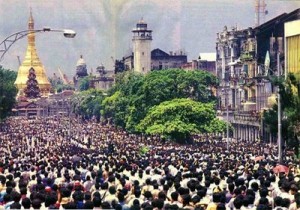 Across the country, on 8 August, commemorations were held to mark the 24th anniversary of mass protests when the people of Burma stood up to a repressive and violent regime in 1988. Sadly this was not the last mass protest to occur and the human rights violations and unjust imprisonment, which spurred the 8.8.88 demonstrations, continue today.
Across the country, on 8 August, commemorations were held to mark the 24th anniversary of mass protests when the people of Burma stood up to a repressive and violent regime in 1988. Sadly this was not the last mass protest to occur and the human rights violations and unjust imprisonment, which spurred the 8.8.88 demonstrations, continue today.
As a response to the demonetizations in 1985 and 1987 that wiped out the savings of families throughout the country, catastrophic mismanagement of the economy and military domination in national politics with ongoing human rights abuses, demonstrations began against the military government. Over the coming months there would be continued protests in all the major cities of Burma reaching a climax in August of that year. By the time the regime regained its control, over 3,000 unarmed citizens were killed and thousands more had been imprisoned and tortured.
The anniversary of 8.8.88 reminds us that the demands and frustration of 24 years ago are still present […]
UN Special Rapporteur Calls for Investigations, Accountability and Reconciliation in Burma
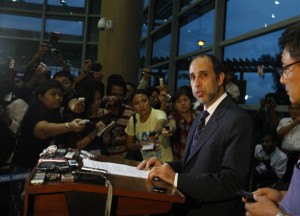 Last week, Tomás Ojea Quintana, the United Nations Special Rapporteur on human rights in Burma undertook his sixth visit to the country. His statement upon leaving Rangoon touched on many crucial issues, including the release of political prisoners, the situation in Arakan State and the need for a truth commission.
Last week, Tomás Ojea Quintana, the United Nations Special Rapporteur on human rights in Burma undertook his sixth visit to the country. His statement upon leaving Rangoon touched on many crucial issues, including the release of political prisoners, the situation in Arakan State and the need for a truth commission.
Quintana welcomed the release of Phyo Wai Aung, a young man falsely accused, tortured and imprisoned for his alleged involvement in bombings during the Thingyan water festival in 2010. While this was a welcome gesture from President Thein Sein, the Assistance Association for Political Prisoners reports that there are an estimated 448 political prisoners still behind bars. Each of these individuals must be released immediately, for as Quintana himself stated, “National reconciliation and democratic transition cannot move forward without this necessary step” […]
Burma’s Military and Economic Elites Continue to Steal the Livelihoods of Rural People
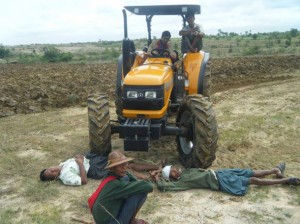 As more and more farmers are losing their lands and livelihoods to corrupt businesses long-associated with the Burma Army, the current government is doing its best to preserve the interests of these wealthy elites at the expense of disempowered rural people. With the onset of the gold rush into Burma, these cronies of the military-backed government are abusing their position to reap the financial rewards of the potential flood of new investment while rural people, who make up 90% of the population, are losing their livelihoods.
As more and more farmers are losing their lands and livelihoods to corrupt businesses long-associated with the Burma Army, the current government is doing its best to preserve the interests of these wealthy elites at the expense of disempowered rural people. With the onset of the gold rush into Burma, these cronies of the military-backed government are abusing their position to reap the financial rewards of the potential flood of new investment while rural people, who make up 90% of the population, are losing their livelihoods.
One such example is from Bwi Daw Village in Kachin State where residents reported last week of local businessmen confiscating their land at gunpoint and subsequently destroying their crops with tractors to make room for a fish farm. For these villagers, there is no legal remedy and have now lost the ability to put food on the table for their families […]
A Long Way to Go for People in Burma’s Ethnic Areas
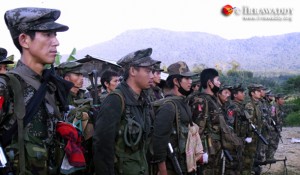 Leaders of ten ethnic and opposition political parties met with President Thein Sein this week for the first time. The meeting in Naypyidaw afforded the opportunity for the MPs to raise key issues, including the rule of law, changes to the electoral system and peace building. However, the government’s response to an MP’s request for the inclusion of ethnic languages and literature in school curriculum was illustrative of how it views the rights of ethnic people and minorities.
Leaders of ten ethnic and opposition political parties met with President Thein Sein this week for the first time. The meeting in Naypyidaw afforded the opportunity for the MPs to raise key issues, including the rule of law, changes to the electoral system and peace building. However, the government’s response to an MP’s request for the inclusion of ethnic languages and literature in school curriculum was illustrative of how it views the rights of ethnic people and minorities.
Railway Minister and Thein Sein’s chief negotiator with armed ethnic groups, Aung Min, said that the government would allow teaching the Mon language and would provide US$1 million to fund it. However, Banyar Aung Moe, an Upper House MP for the All Mon Regions Democracy Party said, “[Aung Min] told us that the teaching time would be out of school hours. I am not satisfied with this as our party proposed allowing teaching in the government’s school time.”
Also this week, the speaker of the Lower House of Parliament, Shwe Mann, reportedly told Banyar Aung Moe that the government agrees to set up a federal union at some point in the future in order to achieve peace. However, when looking at the reality that ethnic people face, it is easy to take such comments as those from Aung Min and Shwe Mann as little more than empty placations […]
Too Much Too Soon: US Lifting of Sanctions Risks Perpetuation of Human Rights Violations
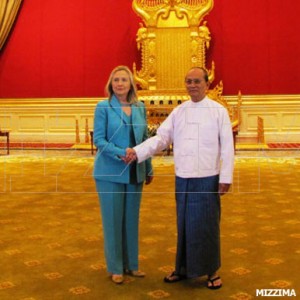 On June 14, Daw Aung San Suu Kyi, speaking at the annual ILO conference in Geneva, warned the international community against dealing with the Myanma Oil and Gas Enterprise (MOGE), “The Myanma Oil and Gas Enterprise … with which all foreign participation in the energy sector takes place through joint venture arrangements, lacks both transparency and accountability at present.”
On June 14, Daw Aung San Suu Kyi, speaking at the annual ILO conference in Geneva, warned the international community against dealing with the Myanma Oil and Gas Enterprise (MOGE), “The Myanma Oil and Gas Enterprise … with which all foreign participation in the energy sector takes place through joint venture arrangements, lacks both transparency and accountability at present.”
Despite this warning, on July 11, the US issued an executive order allowing American companies to invest in Burma’s oil and gas sector, and specifically with MOGE, “Today, the United States is easing restrictions to allow U.S. companies to responsibly do business in Burma.”
Daw Aung San Suu Kyi’s concerns with MOGE stem from the fact that it is a military controlled, state enterprise that has long been associated with some of the gravest human rights abuses documented in Burma, predominantly in ethnic nationality areas where the country’s natural resources are concentrated […]
Still No Freedom for Burma’s Students
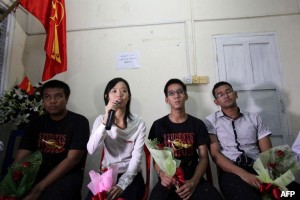 Over the weekend, Thein Sein’s government has shown to harbour the same paranoia regarding students that successive military regimes have held for the past fifty years as nearly two dozen student activists were arrested on Friday evening.
Over the weekend, Thein Sein’s government has shown to harbour the same paranoia regarding students that successive military regimes have held for the past fifty years as nearly two dozen student activists were arrested on Friday evening.
Saturday July 7 marked fifty years since the massacre of students by the Ne Win-led military regime and the subsequent bombing of the student union building at the University of Rangoon. To mark the event, a group of students planned to hold a ceremony at the long-empty building and lay a wreath at its door. Yet in a shameless act of fear, the authorities arrested around twenty student activists in a pre-emptive act, and detained them until after the event had been scheduled to take place. Students were not only arrested in Rangoon, but in Lashio, Mandalay, Shwebo, and Myingyan too. According to an 88 Generation Student spokesperson, the authorities claimed they just wanted to talk to the organizers of the event but this scarcely fools anyone […]
Burma’s Parliament Must Strive for Greater Transparency and Accessibility
This Wednesday, on July 4 the Parliament will resume its work and for the first time will be attended by NLD members elected in the last April 1 by-elections. However, while many media will be in Naypyidaw to report on this symbolic moment, most won’t be able to report what the agenda of the Parliament is for this forthcoming session.
Since it started its activities, Burma’s Parliament has been operating under a veil of secrecy. Many crucial laws that have a direct impact on the country and people’s life have been drafted and adopted behind closed doors, without any substantial deliberation or debate among Members of Parliament.
If the Parliament is to become a democratic tool it must increase its transparency and accessibility. Greater openness will give more legitimacy and trust to the institution. Creating space for people’s participation in the legislative process will be essential for better laws that meet the needs of the people and not just the regime and its cronies […]
• • •








 All posts
All posts